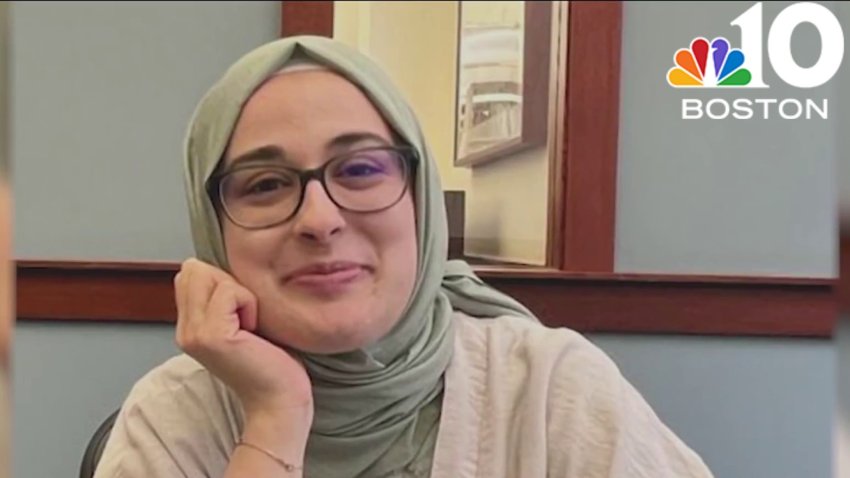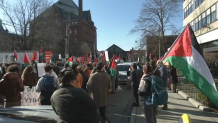At a hearing over where Rumeysa Ozturk’s deportation case should be handled, the federal judge now considering the case said it’s on course for a potential constitutional crisis over which branch has rightful authority. Outside the courthouse, a large rally brought out hundreds of demonstrators calling for Ozturk’s freedom.
A federal judge warned of a possible constitutional crisis while hearing arguments Monday in the latest hearing over a Tufts University student who was detained by immigration officials near her home last month.
U.S. District Judge William Sessions took up the case of Rumeysa Ozturk, who will have to wait at least a little longer to see if she'll be released from Immigration and Customs Enforcement custody — she's currently being held in Louisiana. Sessions is considering whether he has jurisdiction over the case, which attracted widespread attention after her arrest was caught on camera.
Ozturk, a 30-year-old doctoral student, was taken by immigration officials as she walked along a street in Somerville on March 25. After being taken to New Hampshire and then Vermont, she was put on a plane the next day and moved to an Immigration and Customs Enforcement detention center in Basile, Louisiana.
Her lawyers accuse the government of quickly moving her in order to avoid court jurisdiction in New England and are seeking her release, or at least return to Vermont as the case proceeds.
We've got the news you need to know to start your day. Sign up for the First & 4Most morning newsletter — delivered to your inbox daily. Sign up here.
"The fact that she's sitting in detention now for over two weeks is heartbreaking to me and to all of us as Americans, because that's not what our country stands for," said one of her lawyers, Mahsa Khanbabi, on Monday.

The government says Ozturk supports the terror group Hamas, but has provided little evidence. Secretary of State Marco Rubio alluded to a pro-Palestinian op-ed she wrote last year in the student paper. A lawyer for the Justice Department said Monday her case should be dismissed, saying the immigration court has jurisdiction.
U.S. & World
The day's top national and international news.
Sessions said that he believes the case is on a constitutional collision course over which branch of the government has rightful authority in the case. If he orders Ozturk released, citing the violation of her constitutional rights, the Trump administration can argue it's their discretion to keep her detained under immigration law.
Northeastern University constitutional law professor Jeremy Paul said there is a provision in the Immigration and Nationality Act that gives the government power to deport for foreign policy reasons, but notes "there's a clear exception in the statute which says: not for free speech reasons."
He said Rubio is "wildly" abusing his authority in Ozturk's deportation case.
Sessions is giving both the government and Ozturk's lawyers more time to present additional arguments and evidence before he makes a ruling. He floated the posibility of holding the next hearing in May, possibly with Ozturk in court.
Outside the courthouse in Burlington, hundreds rallied to call for Ozturk's release.
"This is McCarthyism of the worst sort," said Ashely Smith, of the Vermont Coalition for Palestinian Liberation.

Diana Osborn, a Vermont resident with children attending school in Boston, said, "If they come for one of our kids all of them are in danger."
Ozturk is among several people with ties to American universities whose visas were revoked or have been stopped from entering the U.S. after they were accused of attending demonstrations or publicly expressed support for Palestinians.
On Friday, a Louisiana immigration judge ruled that the U.S. can deport Columbia University graduate student Mahmoud Khalil based on the federal government's argument that he poses a national security risk.

On Monday, another Columbia student was arrested in Vermont, Palestinian green card holder Mohsen Mahdawi. He led protests against the war in Gaza, and was taken into custody at a Vermont immigration office where he expected to be interviewed about finalizing his U.S. citizenship, according to his attorneys.
Ozturk was one of four students who wrote an op-ed in the campus newspaper, The Tufts Daily, last year criticizing the university's response to student activists demanding that Tufts "acknowledge the Palestinian genocide," disclose its investments and divest from companies with ties to Israel.
A State Department memorandum showed that Ozturk's student visa was revoked on March 21 following an assessment that she had been involved in associations "'that may undermine U.S. foreign policy by creating a hostile environment for Jewish students and indicating support for a designated terrorist organization' including co-authoring an op-ed that found common cause with an organization that was later temporarily banned from campus."
The Washington Post reported Sunday that another memorandum, written by an office within the State Department before Ozturk was detained, determined that there was no evidence showing that she took part in antisemitic activities or made public statements supporting a terrorist organization.
Asked about the report, a State Department representative told NBC News in a statement, "As a general matter, we do not comment on ongoing or pending litigation."
Ozturk's lawyers said Monday that the memorandum has not been supplied to them.

Ozturk said she wants to go back to Tufts so she can finish her degree, which she has been working on for five years. In court documents filed Thursday, she gave an updated account of her detainment.
“I felt very scared and concerned as the men surrounded me and grabbed my phone from me,” Ozturk said in the statement. They told her they were police, and one quickly showed what might have been a gold badge. “But I didn’t think they were the police because I had never seen police approach and take someone away like this,” she said.
Ozturk said she was afraid because her name, photograph and work history were published earlier this year on the website Canary Mission, which describes itself as documenting people who “promote hatred of the U.S.A., Israel and Jews on North American college campuses.”
She said the men didn’t tell her why they were arresting her and shackled her. She said at one point, after they had changed cars, she felt “sure they were going to kill me.” During a stop in Massachusetts, one of the men said to her, “We are not monsters,” and “We do what the government tells us.”
She said they repeatedly refused her requests to speak to a lawyer.
She recalled that the night she spent in the cell in Vermont, she was asked about wanting to apply for asylum and if she was a member of a terrorist organization. “I tried to be helpful and answer their questions but I was so tired and didn’t understand what was happening to me,” she stated.
Ozturk, who suffers from asthma, had an attack the next day at the airport in Atlanta, as she was being taken to Louisiana, she said. She was able to use her inhaler, but unable to get her prescribed medication because there was no place to buy it, she said she was told.
Once she was put in the Louisiana facility, she was not allowed to go outside during the first week and had limited access to food and supplies for two weeks. She said she suffered three more asthma attacks there and had limited care at a medical center.
Ozturk said she is one of 24 people in a cell that has a sign stating capacity for 14.
“When they do the inmate count we are threatened to not leave our beds or we will lose privileges, which means that we are often stuck waiting in our beds for hours,” she said. “At mealtimes, there is so much anxiety because there is no schedule when it comes. … They threaten to close the door if we don’t leave the room in time, meaning we won’t get a meal.”



